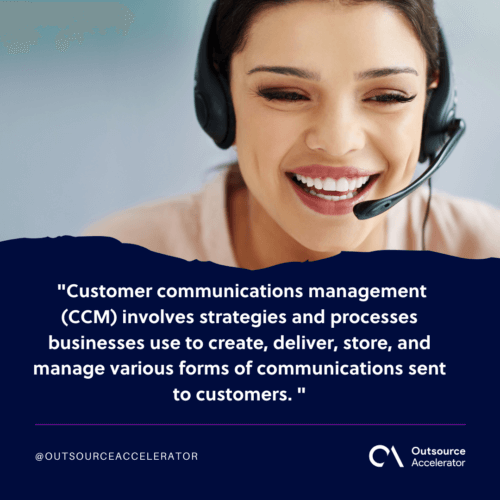Defining customer communications management

Customer communications management (CCM) has become an essential strategy for businesses in today’s digital age.
Organizations must prioritize effective communication to build strong relationships, especially with today’s heavy expectations for personal interactions.
From personalized marketing messages to transactional documents, customer communications management plays a pivotal role in engaging, retaining, and satisfying your audience.
Join us as we unravel the essential elements of CCM and how it can transform your customer relationships and boost performance.
What is customer communications management?
Customer communications management (CCM) involves strategies and processes businesses use to create, deliver, store, and manage various forms of communications sent to customers.
These communications encompass a wide range of materials, including:
- Invoices
- Statements
- Marketing collateral
- Transactional documents
- Customer service messages
- Notifications
- Renewal information
- Claims correspondence

The primary objectives of customer communications management are to ensure that communications are:
- Effective – They should deliver the intended message to customers in a clear, engaging, and personalized manner.
- Efficient – The creation and delivery of communications should be streamlined and cost-effective, often through automation.
- Consistent – CCM must maintain a uniform brand voice, style, and messaging across all communication channels.
- Compliant – Ensure that all communications adhere to legal and regulatory requirements, such as data privacy laws and industry standards.
- Personalized – Utilize customer data to tailor messages to individual preferences and behaviors.
CCM solutions typically involve software platforms that centralize the creation and management of communication templates and content. These platforms often integrate with customer databases and other systems.
Why is customer communications management important?
Probably the most important reason why customer communications management matters is its ability to personalize customer interactions. In the modern marketplace, personalization is no longer a luxury but an expectation.
Customers want to feel valued, understood, and appreciated by the businesses they engage with. By leveraging customer communications management, businesses can deliver personalized messages that address those needs.
Personalization is a competitive advantage in today’s business environment. It drives customer engagement, reduces churn, and catapults satisfaction to new heights.
As businesses continue to evolve, personalization within CCM will remain the beacon guiding them toward forging lasting customer relationships and achieving sustainable growth.
Benefits of customer communications management
Customer communications management offers a wide array of benefits to businesses. Here are the key benefits of CCM:
Streamlined processes
CCM solutions offer automation of communication creation, delivery, and management. Businesses can potentially save time, reduce costs, and allocate resources more effectively.
With streamlined processes, your staff can instead focus on more value-added tasks.
Branding consistency
Customer communications management helps maintain a consistent brand voice, style, and messaging across all communication channels. This reinforces brand identity and builds recognition.
Enhanced customer experience
CCM solutions leverage customer data to drive better responses and conversions.
Customer communications management enables businesses to deliver consistent and personalized messages across different channels. These kinds of timely and relevant communications improve customer satisfaction and foster trust.
Improved decision-making
Customer communications management facilitates the collection of customer feedback. This data can be used to continuously refine and enhance communication strategies by guiding informed business decisions.
By analyzing data, organizations will be able to adapt and respond quickly to market changes and customer preferences. This strategy ensures continued relevance and competitiveness.
Regulatory compliance
Customer communications management helps ensure that all communications adhere to legal and regulatory requirements. As a result, there is a lower chance of non-compliance, penalties, and reputational harm.

Increased customer loyalty
Businesses can foster stronger customer relationships by delivering personalized and consistent communications. This leads to improved loyalty and increased business growth through a more stable and profitable customer base.
Customer communications management helps firms to provide exceptional customer experiences and maintain a competitive edge in the dynamic marketplace.
8 customer communication management strategies to remember
Here are some key customer communications management strategies that businesses can employ to enhance their communication processes:
1. Customer segmentation
Based on demographics, behavior, or preferences, divide your consumer base into various categories.
This enables you to develop targeted communication strategies for each segment, delivering the right message to the right audience at the right time.
2. Customized preferences
Leverage customer data and analytics to tailor your communications to address individual customer preferences, needs, and behaviors.
Call customers by name, provide product recommendations based on past behavior, and customize content to their interests. This makes your audience feel valued and understood.
3. Omnichannel communication
Meet customers on their preferred communication channels, whether it’s email, social media, SMS, or mobile apps. Provide a seamless and consistent brand experience across all channels to enhance engagement and convenience.
4. Proactive communication
Anticipate customer needs and engage in proactive communication. This can include sending personalized offers, updates, or relevant information to ensure customers feel informed and supported throughout their journey.
5. Automation and integration
Customer communications management software exists to streamline processes, automate repetitive tasks, and ensure consistent messaging across channels.
Automated workflows can trigger communications based on customer interactions or specific events. Utilize marketing automation to personalize and streamline customer interactions at scale.
CCM software can also be integrated with your customer relationship management (CRM) and enterprise resource planning (ERP) systems. It allows you to access customer data and transaction history easily, providing more context for communications.
6. Transparency and authenticity
Be transparent and authentic in your communications. Build trust by communicating openly and honestly, addressing customer concerns, and delivering on brand promises.
7. Feedback loop
Actively seek customer feedback. Establish mechanisms for collecting feedback from customers regarding the effectiveness of your communications.
You can use methods like:
- Surveys
- Reviews
- Social media monitoring
Study and act on this feedback to continuously improve your customer communications strategy.
8. Continuous improvement
Recognize that customer communications management is an evolving process. Stay updated with new technologies, industry best practices, and emerging CCM trends to ensure your strategy remains effective.
Remember, the best customer communications management strategies will vary depending on your specific industry, target audience, and business goals.
How to choose a customer communications management software
When choosing a customer communications management software, consider the following factors:
Specific business needs
Begin by identifying your unique business requirements. What types of communications do you send, and through which channels?
Understand your current and future needs to find a solution that aligns with your goals. Assess the software’s features and functionality to ensure it aligns with your specific needs.
Multi-channel support
Given the diversity of customer communication preferences, select CCM software that supports multiple communication channels, including:
- SMS
- Social media
- Mobile apps
This versatility ensures you can reach customers through their preferred methods.
Ease of use
Evaluate the software’s user interface and its ease of use. It should be intuitive and require minimal training for your team to adopt and utilize the software effectively and quickly.
Whenever possible, opt for a trial or demo version of the CCM software to assess its usability
and compatibility with your business processes. Testing helps you make an informed decision.
Integration capabilities
Determine how well the software integrates with your existing systems, such as CRM, marketing automation, or content management platforms. Integration capabilities are essential for data access and workflow automation.
Scalability
Consider your organization’s growth potential. Choose a customer communications management solution that can scale with your business.
It should be able to accommodate increased communication volumes, customer data, and additional features without performance issues as your company expands.
Security and compliance
Security is paramount when dealing with customer data. Verify that the software complies with data protection regulations and has robust security measures in place to safeguard customer data.
Customization and personalization
Personalization is a key feature of customer communications management. Look for software that enables robust personalization, allowing you to customize messages to individual customer preferences and behaviors.
Analytics and reporting
The software should provide analytics and reporting capabilities to assess the success of your communication campaigns. You should be able to monitor open rates, response rates, and conversion rates to make data-driven improvements.
Support and training
Take into account the degree of training and assistance offered by the software vendor. Ensure they offer comprehensive documentation, training resources, and responsive customer support to address any issues or questions that may arise.
Adequate training and ongoing support are critical for a successful CCM software implementation.
Cost and ROI
Evaluate the pricing structure of the software and compare it with the value it can deliver. Assess the total cost of ownership, which includes initial purchase costs, ongoing maintenance, and support expenses.
Examine the return on investment (ROI) you can expect by implementing the software in terms of improved customer engagement, operational efficiency, and cost savings.
Vendor reputation
Research the vendor’s reputation, customer reviews, and case studies to gauge their reliability and track record. Gain as much insight as you can to assess their success in delivering CCM solutions.
The right choice of customer communications management software will contribute to the overall success of your organization.
Increasing retention with customer communications management
In today’s highly competitive business landscape, increasing customer retention is a key priority for companies seeking sustained growth. Effective customer communications management strategies play a crucial role in achieving this goal.
The essence of this phenomenon lies in trust. Customer communications management, when executed effectively, conveys that a company values its customers and invests in understanding their preferences.

Such personalized attention is a rare and cherished commodity. The trust that results from this personalized approach is the bedrock upon which long-lasting customer relationships are built.
Businesses that understand the significance of customer communications management are better positioned to:
- Foster enduring relationships
- Drive customer loyalty
- Achieve long-term growth and success
As businesses continue to evolve, it is clear that customer communications management will remain a cornerstone in increasing retention and loyalty. It will guide organizations toward a future of sustained success.







 Independent
Independent




